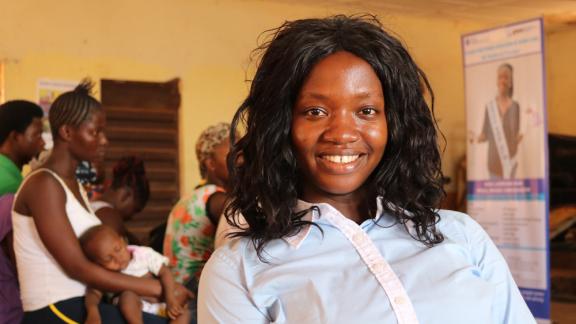Freetown, Sierra Leone -- On a hot Tuesday afternoon at the Dwazark Community Hall, Marian Pleasant Kargbo, a volunteer youth educator with Planned Parenthood Association of Sierra Leone (PPASL) addresses a group of women. With her refined, articulate speech, Marian’s voice effortlessly grips the attention of her audience.
Her audience is women of varied ages – from teenage girls to women in their fifties. Eagerly attentive, some of them are housewives, casual laborers and small-scale traders, while others are on their lunch break from their places of work within the neighborhood.
Marian is sharing information with them on issues surrounding sexual and reproductive health. It is a community health outreach event organized by PPASL in Dwazark. Dwazark is one of the low-income neighborhoods located in Sierra Leone’s capital city, Freetown.

In this community, various health challenges plague the women folk. The rate of teen pregnancies is high, and so is the rate of maternal and infant mortality. It is for this reason that PPASL conducts regular community health outreach programmes in Dwazark.
Marian Pleasant often participates in these programmes.
“I find great fulfillment in helping girls and young women learn more about their sexual and reproductive health. Dwazark is a community with low literacy levels, and it is especially worse for the women. During these outreach sessions, I help increase women’s awareness about their reproductive health, which then enables them to make better and informed choices about their sexual health and well-being,” she says.
Adequate Birth Spacing
During today’s outreach session, one of the issues that Marian is talking about is birth spacing. She asks them this question:
“How far apart do you think a mother should wait before getting pregnant with her next child?”

Responses are diverse. Some are of the opinion that two years are ideal, others five, others three years, while others opine that as soon as the child starts walking at nine months to one year, then that child is ready for another sibling.
“We let them discuss amongst themselves first, before the team from PPASL comes in to give more information and provide clarity on the matter. Births that are closely spaced significantly contribute to poor birth outcomes. It is for this reason that educating the women on the need for adequate birth spacing helps increase their understanding of the issue,” says Marian.
During such sessions, the women are informed about the importance of planned pregnancies, and the use of family planning to achieve this. Counseling on family planning is given to the women and for those who need them, they are given contraceptives. Before that, their weight, blood pressure and other important health checks are undertaken before they are advised on the best contraceptive method. All these services are given to the Dwazark women at no cost.

The women are also referred to the PPASL clinics for follow-up and to receive more information. Young girls and mothers are particularly encouraged to visit the nearby PPASL youth-friendly center in Kissy, where they can find more information and services. They can also hang out with their peers there.
‘Incomplete Mothers’ because of Caesarean Births
“For many women who deliver their first child via a necessary caesarian section in hospital, they are ridiculed and told that they are not ‘complete mothers’. They are mocked and told that they are weakly. In fact, their husbands and mothers-in-law are the ones who scorn them the most. This makes the women feel reluctant about giving birth in hospital again because they may undergo a caesarean section again, which will be followed by more ridicule.
This has resulted in them shying away from giving birth at a hospital, where such attempts have led to the unfortunate deaths of many babies and in some instances, the mothers themselves,” says Marian.

Marian adds that during such community outreach programs , women are urged to deliver in hospitals, by making them aware of the dangers of delivering at home without skilled assistance.
“Since older women form part of our audience, we implore them not to discourage their daughters-in-law or younger female relatives from delivering through caesarean section. Mothers-in-law have great influence over their sons. We encourage them to share this information with their friends back at home,” says Marian.
Sex Education with Daughters
Since teenage pregnancies are also high in Dwazark, Marian uses these community outreaches to emphasize the need for parents to talk to their adolescents and teens about sex.
“After speaking with many teen moms, many say they became pregnant after their first sexual encounter. They had never really had the ‘sex talk’ with their parents.

During the outreach sessions, we encourage parents to have age-appropriate discussions with their children about how they can prevent teenage pregnancies. We tell them that there is no shame in empowering their daughters with information about sex, as this will help their daughters be more knowledgeable and make wiser decisions when faced with the prevailing situation. We also encourage them to have related conversations with their sons,” concludes Marian.
Maryanne W. Waweru is the Governance and Compliance Officer, IPPF Africa Region.
For more information about the work of IPPF Africa Region, connect with us on Facebook and Twitter.
when
country
Sudan
Subject
Related Member Association









